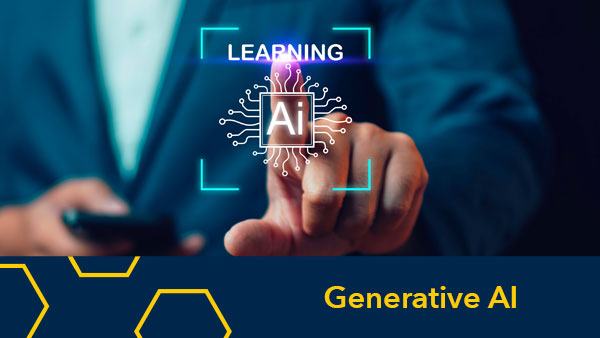Briana Johnson, Center for Academic Innovation
Leaders and workers everywhere are grappling with the uncertainty of generative artificial intelligence (AI) within their organizations. To provide people across industries with the education and training they need in job-specific generative AI skills, the Center for Academic Innovation has launched 15 new courses taught by University of Michigan faculty. They include contributions from eight of U-M’s schools and colleges, including the Ross School of Business, the School of Music, Theatre, & Dance, the Law School, and the College of Literature, Science, & the Arts. These courses and series expand a growing portfolio of short courses from Michigan Online, which learners can complete in under a day.
Understanding the Rise of Generative AI
Josh Pasek, associate professor in communication and media studies, felt the best way to understand the future of AI was to look to the past, where several of our most prolific technological advances were once seen as disruptions. “The fact that we’ve been through disruption before and come out the other side? We know we can do this,” he said.
Beyond looking to the past for answers, Pasek’s four-course series, Navigating Disruption: Generative AI in the Workplace, explores the impact of generative AI on workplace tasks, industry effects, and the risks associated with adoption. He said his goal is to empower learners with the information they need to combat the fear and uncertainty related to disruptive technologies.
AI for Industry Professionals
Other courses took an industry-based approach, highlighting generative AI’s advantages on tasks such as organization and delegation.
“Artificial intelligence, when used well, can help with each of those things—but the assistance it provides is by no means costless or risk-free,” said Patrick Barry, clinical assistant professor of law at the School of Law and course instructor for AI for Lawyers and Other Advocates. The four-course series covers writing, speaking, and creative problem-solving, alongside how to use generative AI for meetings, counseling clients, and delegating tasks. “We hope [the series] teaches people, in a simultaneously fun and rigorous way, how to skillfully navigate the risk-reward trade-off that working with AI tools presents.”
AI for Creative Work offers another unique perspective on the tangible ways workers can use generative AI in their creative practice. The series features the perspectives of several content creators, including costume designers, writers, singers, and graphic designers. It addresses the power we have in relationship to these technologies and how they can support our creative processes.
AI Integration from a Leadership Perspective
Leaders must look at the larger picture of generative AI through emerging leadership frameworks, said Monica Worline of the Stephen M. Ross School of Business.
“As long as people are feeling fearful for their futures and threatened by AI, they will reject or resist its full integration and overlook its potential for transformational change,” said Worline, the faculty director of the Center for Positive Organizations at Ross. “Because the course approaches adaptability to AI-driven change from a foundation in the social science of thriving systems, it offers crucial and timeless leadership insights in ways that are also timely and essential to how successful organizations will adapt with AI.”
Worline’s course, Generative Leadership: Inspiring Adaptability in an AI World, is designed for leaders who want to help their teams adapt during times of uncertainty. The course introduces the framework’s core principles to help them cope with the constantly changing landscape.
A Future ‘Golden Age of Business’
While AI’s impact on the workplace has already started, for Andrew Wu, associate professor of technology and operations at Michigan Ross, the most exciting part of AI is yet to come. “In five years, we’re going to have a golden age of business, where the connection between business decision-making and data is going to be much, much closer thanks to the accessibility that AI tools bring,” he said.
His three-course series, Generative AI in Business, prepares entrepreneurs, business owners, and leaders to think tactically and strategically about adopting generative AI into their organizations. The series outlines the PAD framework—Problem, Abilities, and Data—that helps individuals identify the work areas that would most benefit from generative AI integration.
The series is informed by his experiences consulting companies on generative AI. Wu saw a growing need for a step-by-step approach to generative AI adoption, and to provide clarity to organizations considering their approach. “We don’t have a long history of implementing generative AI into businesses,” he said. “But we do have a very long history [in business technology] of both successes and also very, very important failures.”
Wu hopes that as generative AI becomes more integrated into company structures, it will foster stronger connections and unlock improved decision-making, efficiency, and value for organizations. Each course is designed to help individuals take the lessons learned and apply them almost immediately to their work, increasing competency in generative AI and making for more comfortable transitions into a workforce that looks at generative AI as a partner and not a deterrent to high-level execution.
These new courses will soon be added to the existing AI Collection, in which the center spotlights generative AI education available on Michigan Online. The collection is home to videos, articles, and access to courses curated into thematic playlists and provides free resources to help learners explore these powerful tools. The collection is continually updated to capture the growing advancements in generative AI, ensuring learners have access to the latest insights and developments in the field.


